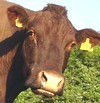Human health risk “very low” from eating TB-infected meat, says Food Standards Agency

The risk to human health from eating meat contaminated with bovine tuberculosis is “very low”, according to the Food Standards Agency in response to a report suggesting meat from 3000 TB-infected cattle could be entering the food chain each year.
On Monday (24 July) the Badger Trust published a report suggesting a “fundamental weaknesses in the government’s bovine tuberculosis testing regime” means infected meat is unwittingly be processed for human consumption.
The report seeks to highlight the failings of the tuberculin skin test in detecting infected animals. According to the Trust’s report at least 11% of TB-infected cattle are missed by the skin test for bovine TB. Of those, only 14% show “visible TB lesions” at the slaughterhouse.
As a result, the Trust claims, the remaining 86% of cattle missed by the skin test could make it into human food despite being infected with bovine TB.
“With 500 cases of TB-lesioned cattle spotted at slaughterhouses in 2005, that means that up to 3,000 infected cattle probably made it into food for human consumption last year without being detected,” said Trevor Lawson, spokesman for the Trust.
As well as calling for increased testing frequency the Trust also criticises DEFRA over its use of the gamma-interferon test.
“The government could easily identify this hidden reservoir of infected cattle by using the gamma-interferon TB blood test across the country.
“While the government’s own experts acknowledge that the skin test only finds 66% of infected cattle, by using gamma interferon 95% of infected animals would be found,” added Mr Lawson.
“Farmers are persistently being misled by everyone in DEFRA from Ben Bradshaw to regional vets.
“Quite frankly the minister doesn’t have the courage to admit that he’s been duped by his vets for the past decade as to the suitability of the gamma-interferon test.”
But, while the FSA did not deny meat from TB infected cattle may be entering the food chain, it did say that all cattle were inspected after slaughter in accordance with EU law.
“Those testing positive with widespread lesions are not allowed to enter the food chain. Where a carcass shows evidence of localised TB, the lesions are cut out and the rest of the carcass is passed as fit for human consumption. This is in accordance with EU legislation,” said a statement.
